Social Montage: Speak-Act-Print-Publish
Gallery 2 Castle Mills, Edinburgh Printmakers
15 June – 1 July 2019
Partisan Social Club PSC aims to create new political groups and alternative models of working collectively in order to alter the social relations of their artworks; they call this Social Montage. PSC understand their Social Montage events as different from site-specific artworks, which typically foreground the history of a place calling for an interpretation of a textual story to generate a new meaning. Alternatively, Social Montage is an assembled event consisting of a number of parts which include elements of life and art. Nevertheless, like site specific artworks, Social Montage occurs in a place and refers to a certain political moment. To formulate Social Montage events; PSC write a slogan text; develop a carrier for the slogan text (usually a prop); utilize the body to shout it, carry it or wear it; act in the situation; stand in the place; uncover a political perspective; run a workshop and invite others to agree or disagree.
Social Montage is intended to focus on the encounter that one has in any particular space; the point at which the participant, passerby, spectator, and reader etc, engages with one or more of the factors set out within the artwork. The montaging of bodies, texts and actions onto and into public space creates new social arrangements and demonstrates the contingent nature of space, site and politics. Hence, Social Montage is intended as a mechanism for acknowledging all aspects of the apparatus when making artworks in the public sphere. Political theorist Giorgio Agamben explains the apparatus as, ‘a network, which can be established between discourses, architectural forms, regulatory decisions, laws, philosophical, moral and philanthropic forces.’ 1 And in Kristin Ross’ recent book ‘The ZAD and NoTAV’ 2, she elucidates on how people have developed original ways of merging everyday life with political struggle to redesign the future of their respective environment. Both of these perspectives influence the way in which PSC think of, and make Social Montage.
For their exhibition ‘Social Montage: Speak-Act-Print-Publish!’, PSC have focused on ideas of labour. The new slogans are informed by Bruno Gulli’s ontology of labour 3, in which he presents an alternative framing of labour as essential to our society; Gulli asserts that our current understanding of work is one that is co-opted by capitalism for the accumulation of private wealth and accordingly he attempts to recast labour as a type of human agency, in order that we can reclaim it for new social and collective endeavours.
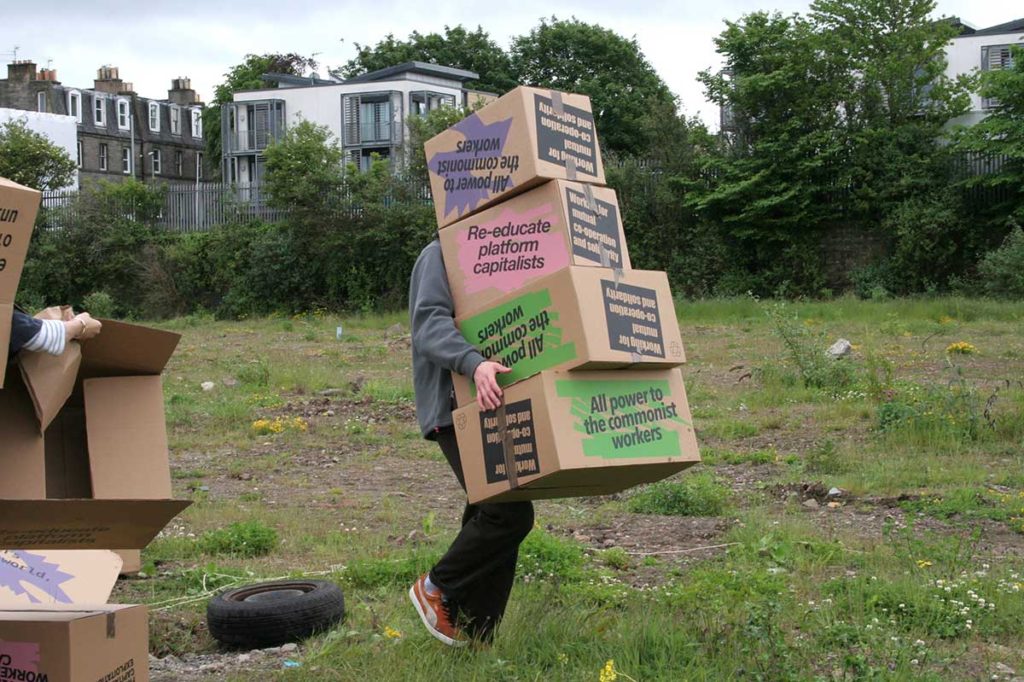
Whilst in residence in the print workshop at Edinburgh Printmakers, PSC worked with artist and technician Anupa Gardner to screen-print eight new slogans onto four sides of 130 cardboard boxes. ‘Social Montage: Speak-Act-Print-Publish!’ aims to make printmaking ‘public’ by exploring the relationship between print and publishing. By printing a slogan-text onto a 3-dimensional mass produced object the work invites engagement through looking, reading and physical interaction. The boxes bear the texts: Free work from capitalist exploitation; Working for mutual co-operation and solidarity; e-Workers of the world, unite!; Re-educate platform capitalists; All power to the commonist workers; End the accumulation of capital - work to satisfy human needs; Labour for common wealth not private property; Living labour - workers against capital.
The new slogans call for us to recognize the potential of work beyond wage labour, thus identifying with Friedrich Engels famous analysis of the motto, attributed to English-working class, ‘A fair day's wages for a fair day's work!’, crica 1824. He says ‘The fairness of political economy, such as it truly lays down the laws which rule actual society, that fairness is all on one side - on that of Capital. Let, then, the old motto be buried forever and replaced by another: Possession of the Means of Work - Raw Material, Factories, Machinery - By the Working People Themselves.’ 4
The slogans also refer to the realities of contemporary working conditions as articulated by Nick Srnicek. In his book ‘Platform Captialism’ 5, he describes global tech companies as ‘economic actors within a capitalist mode of production’, rather than cultural or political actors who are informed by cultural values. These companies’ actions are merely innovative ways to accrue more capital, in this case through the pursuit of data collection and the management of services.
Once the slogan-boxes were printed and ready to construct, PSC ran a workshop in which the participants heard about slogan writing and the function of slogans for political action. The aim of PSC’s workshops is to exchange political ideas through the discussion of differences through conversations. The workshops and subsequent publishing of texts enable the exchange of opinion and the formation of new values.
Edinburgh Printmakers have relocated to an ex-factory building in Fountainbridge, the surrounding area between the building and the canal is awaiting redevelopment and is mainly unoccupied brownfield site. The workshop members (new PSC members by default) took the slogan-boxes to the nearby site; they made an obstacle course, built arbitrary structures, put up a wall, strung them together, defaced them- at times disconnecting them from their slogan, filled them with debris and embodied the slogans by carrying and wearing the boxes. This defiant response by the group could be ascribed to a number elements; the stirring labour slogans, the disposable nature of the mass-produced boxes, the camaraderie produced through working together, and the sense of freedom and potential that the wasteland offered, uninhibited from the typical rules of public space. They embraced the opportunity to act-up and perform a Social Montage event; working on something together provides material for the transformation of one’s own subjectivity through the action of collaboration.
Thank you: Edinburgh Print Workshop: Alastair Clark and Anupa Gardner PSC Edinburgh Members: Kate Davis, Lorenzo Robertson, Madeleine Wood, Jack Whitelock.
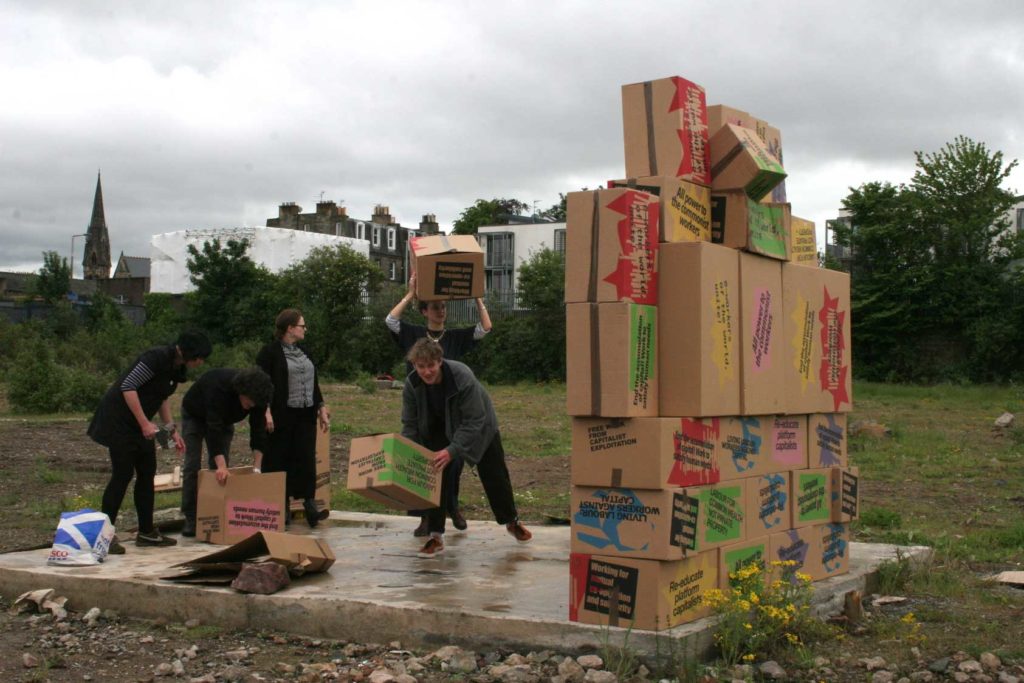
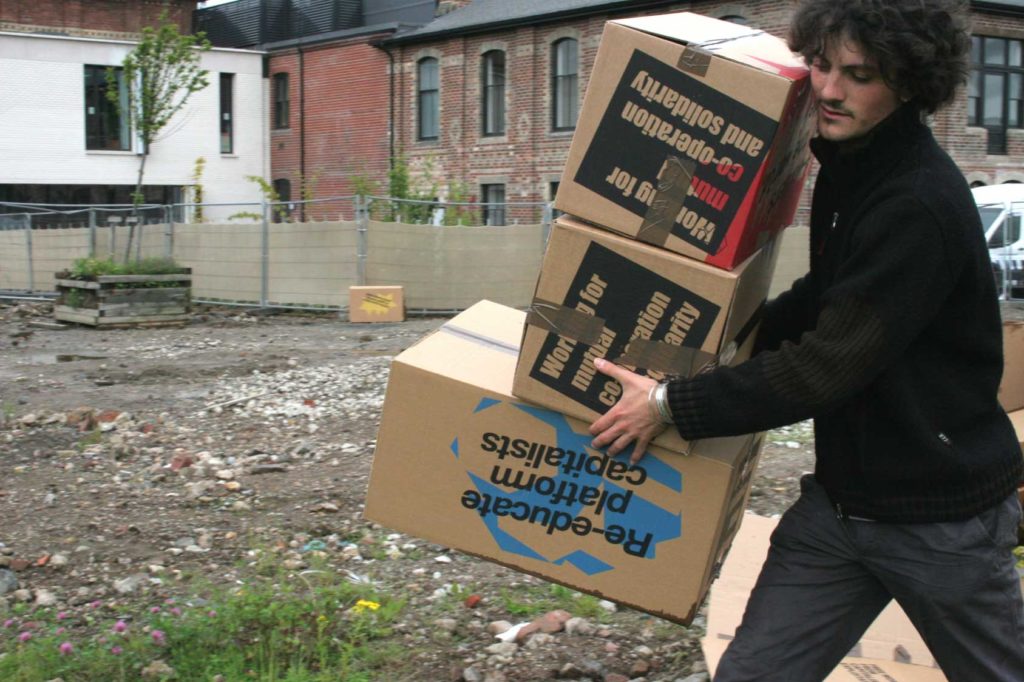
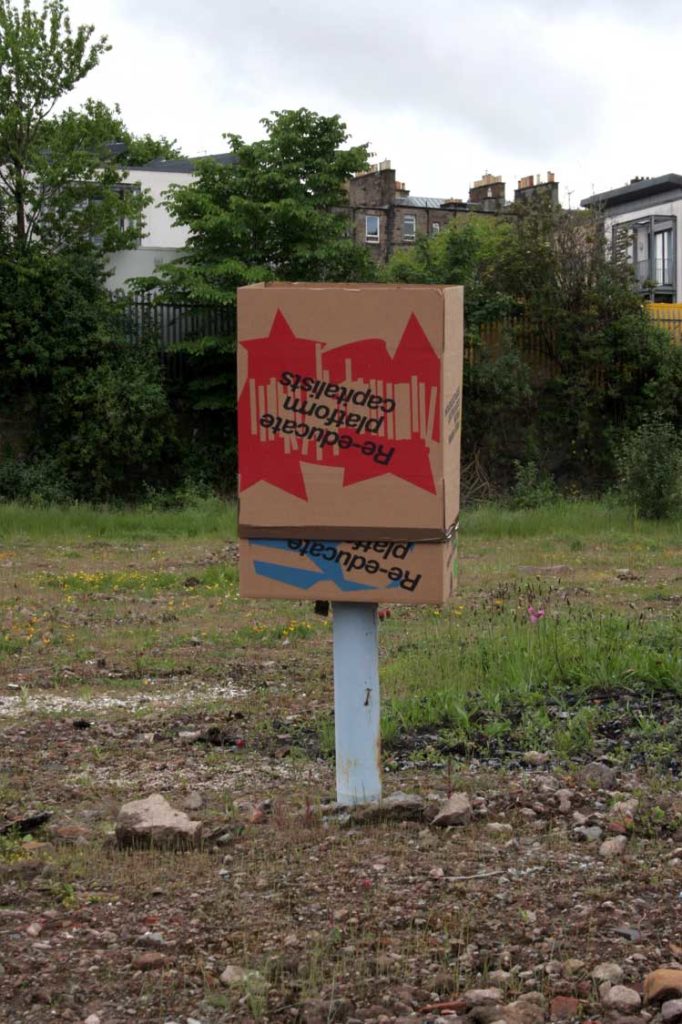
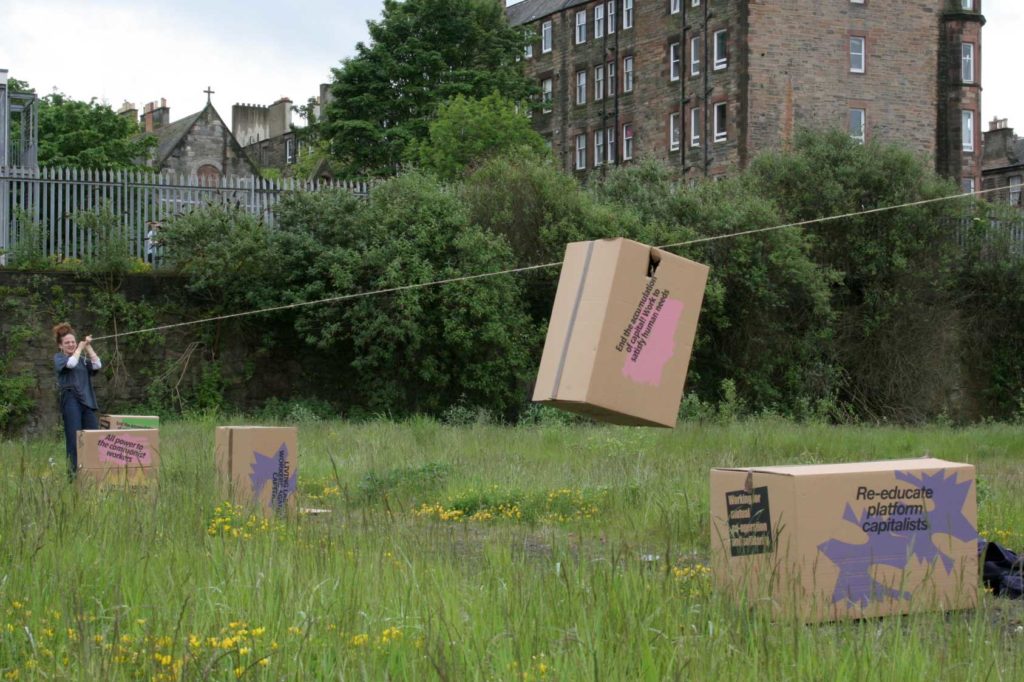
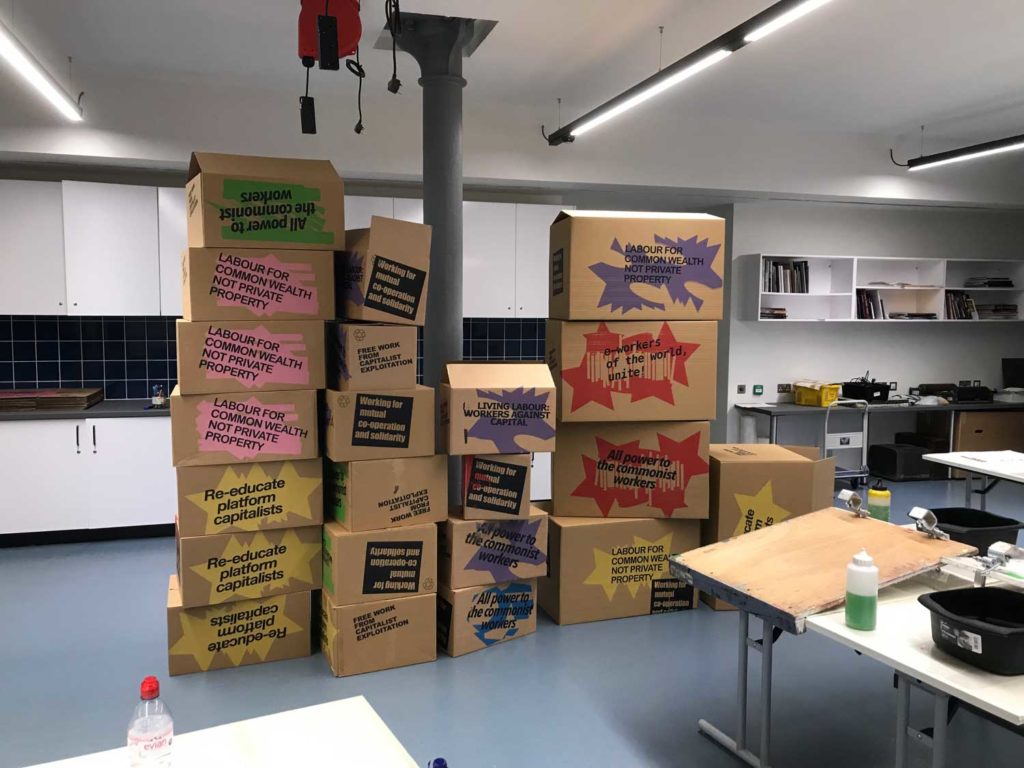
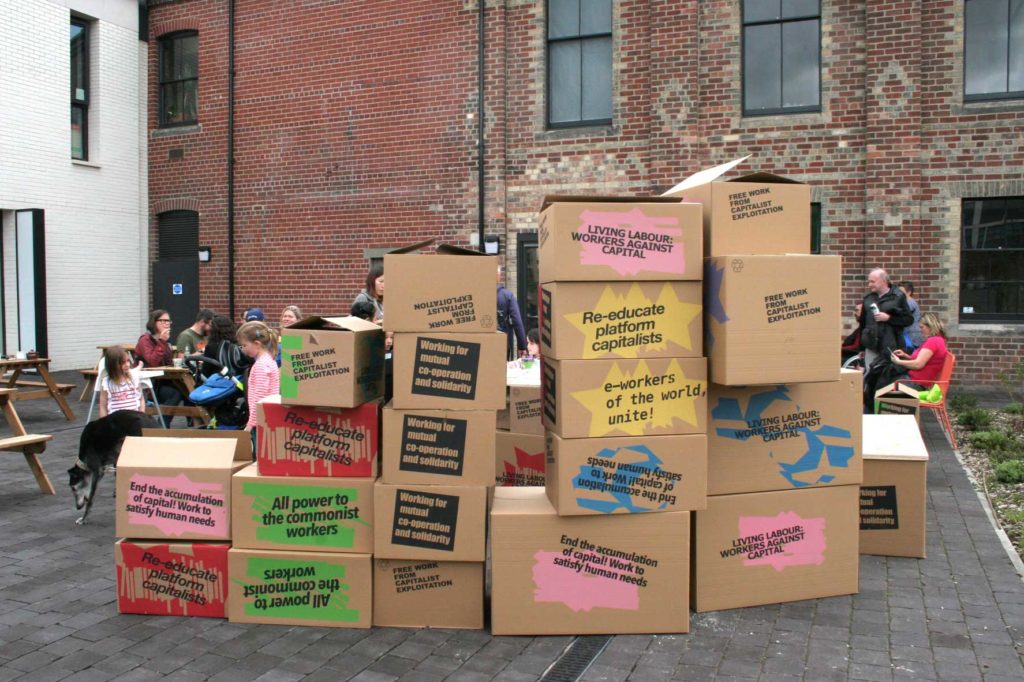
References
1. Agamben, G, What is Apparatus? and other essays, Stanford University Press, 2009
2. Mauvaise Troupe Collective, ‘The ZAD and the NoTAV’, translated with a preface by Kristin Ross, Verso, London 2018
3. Gulli, B., Labour of Fire: The Ontology of Labor between Economy and Culture, Temple University Press, 2005.
4. Engels, F., A Fair Day's Wages for a Fair Day's Work, Labour Standard, 1881. https://www.marxists.org/archive/marx/works/1881/05/07.html Accessed 29 May 2019
5. Srnicek, N., Platform Capitalism, Polity Press, 2017
